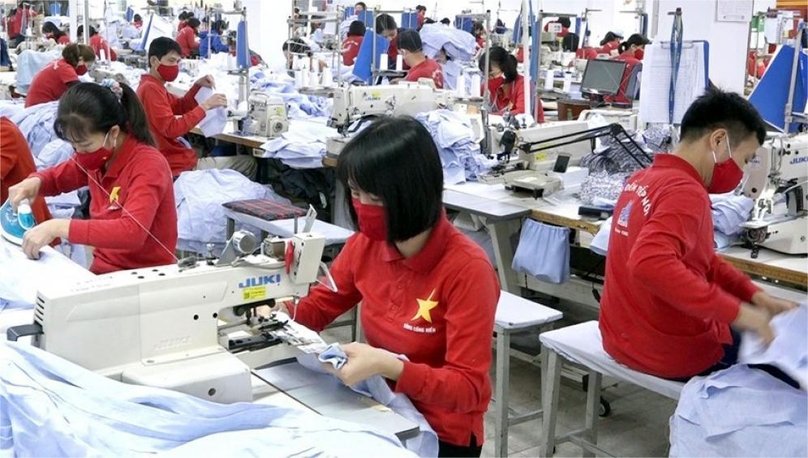Diversifying export markets, increasing production localization to offset impacts of Trump policies: RMIT lecturer
Enhancing localization of production to boost economic autonomy is a key strategy to mitigate the potential negative effects of the U.S. President Donald Trump’s trade policies, according to Dr. Ha Cam Van, a senior lecturer of economics at RMIT University Vietnam.
Van said the U.S. is Vietnam's largest export market, making key sectors like electronics, textiles, and footwear highly susceptible to increased tariffs.
During Trump’s first term, Vietnam was one of the biggest beneficiaries of the U.S.-China trade war, as many global manufacturers relocated factories from China to Vietnam to avoid U.S. tariffs.
This shift allowed Vietnam to achieve the third-largest trade surplus with the U.S., behind China and Mexico. While Southeast Asia overall benefited from the trade war, Vietnam stood out due to its proximity to China and its business-friendly policies, Van noted.

Dr. Ha Cam Van, a senior lecturer of economics at RMIT University Vietnam. Photo courtesy of RMIT.
Under President Joe Biden, the U.S.-Vietnam relationship strengthened further, with an upgrade to a comprehensive strategic partnership. However, Vietnam’s economic success has also made it vulnerable due to its heavy reliance on the U.S., which accounts for nearly 30% of its total exports.
In 2024, Vietnam’s trade surplus with the U.S. reached $104.6 billion, up 25.6% from 2023, positioning Vietnam as a potential target under Trump’s renewed tariff policies, according to Van.
Vietnam has become a key manufacturing base for major U.S. companies like Apple, Google, Nike, and Intel, and plays a critical role in the global supply chain. However, Trump’s trade policy, which emphasizes reducing trade deficits through tariffs and promoting domestic production, could identify Vietnam as a haven for Chinese companies circumventing U.S.-China trade tensions.
"If this occurs, Vietnam could face increased tariffs on its exports to the U.S., following a similar trajectory as China under Trump’s "2.0" trade strategy," said Van.
Moreover, Trump has proposed imposing tariffs of up to 20% on all imports into the U.S. Such a move would increase the price of Vietnamese goods, reduce their competitiveness in the U.S. market, and jeopardize Vietnam’s ability to maintain its market share.
As a result, Vietnam’s export revenue could decline, creating trade balance deficits or reduced surpluses. Comprehensive tariffs on imports proposed by Trump would raise the cost of Vietnamese goods in the U.S., eroding the competitive edge of major export sectors like electronics, garments, and footwear. Vietnamese companies involved in global supply chains may face challenges in maintaining contracts and securing markets, Van added.
Foreign direct investment (FDI) flows could also be impacted by global instability and protectionist U.S. policies. FDI enterprises in Vietnam, particularly those from South Korea and China, might become wary of potential tariffs from a new Trump administration. If such tariffs are implemented, these companies could delay or scale back investments and production in Vietnam, as the advantages of low import taxes for "Made in Vietnam" goods diminish.
South Korea and China are among the largest sources of FDI for Vietnam. A decline in FDI from these countries could significantly hinder industrial development and export growth. Given Vietnam’s reliance on FDI for industrial expansion, reduced capital inflows could slow the country’s economic growth, Van noted.

Garment is one of Vietnam's biggest export earners in the U.S. market. Photo courtesy of the government's news portal.
To counter potential challenges, she suggested, Vietnam should diversify its markets and supply chains, reducing dependence on the U.S. by expanding exports to the EU, Japan, and ASEAN. Additionally, increasing localization of production can enhance economic autonomy. Flexible monetary policies, such as monitoring exchange rates, controlling inflation, and adjusting interest rates, will help stabilize capital flows and support businesses.
Do Ngoc Hung, Vietnam’s trade counselor in the U.S., highlighted that Trump’s second term could significantly affect global trade, investment, and Vietnam-U.S. trade relations due to anticipated economic and foreign policy adjustments.
“To boost exports to the U.S., Vietnamese businesses should collaborate with importers and distributors to explore flexible payment methods and share risks, particularly during early market entry,” Hung advised.
Economist Vo Tri Thanh, former vice head of the Central Institute for Economic Management (CIEM), stressed the importance of agricultural and food exporters investing in cold storage facilities to develop large-scale distribution centers at major ports. Such infrastructure could reduce costs and enable companies to operate more proactively across multiple product groups.
Thanh said that in 2025, external factors such as exports may not be favorable, so the government is looking forward to internal factors. Good connectivity, adaptability, creativity, and strong action are essential for Vietnamese businesses in the current context.
- Read More
Vingroup plans $38 mln bond issuance to restructure debt
Vingroup (HoSE: VIC), Vietnam’s largest listed company by market cap, plans to issue VND1 trillion ($37.91 million) in bonds via private placement as it seeks to restructure debt.
Companies - Tue, November 25, 2025 | 3:52 pm GMT+7
Vietnam gov't proposes minimum $379 mln charter capital for offshore wind developers
The Vietnamese government has proposed that offshore wind power developers have a minimum charter capital of VND10 trillion ($379 million) each, according to a draft resolution designed to ease bottlenecks in the country’s 2026-2030 energy development plan.
Energy - Tue, November 25, 2025 | 3:41 pm GMT+7
Petrovietnam arm to venture into CO2 transportation, seabed minerals, geothermal
PVEP, the upstream arm of state giant Petrovietnam, plans to expand into new fields such as CO2 transportation and disposal (carbon capture, utilization, and storage), coal gas and underground mineral research, seabed minerals, and geothermal.
Industries - Tue, November 25, 2025 | 3:08 pm GMT+7
MB successfully closes landmark $500 mln inaugural green term loan facility agreement
Military Commercial Joint Stock Bank (MB) on Monday announced the successful closing of its three-year $500 million inaugural Green Term Loan Facility Agreement, marking a significant milestone in the bank’s sustainable financing journey.
Banking - Tue, November 25, 2025 | 2:17 pm GMT+7
Impact of rising exchange rates in Vietnam
Mirae Asset Securities analysts offer an insight into the impact of rising exchange rates on companies in Vietnam in a report dated November 21.
Economy - Tue, November 25, 2025 | 1:35 pm GMT+7
Vietnam's industrial park developers post strong earnings as tenant demand rebounds
Vietnam’s industrial real estate sector is showing stronger earnings and improving demand, with foreign tenants resuming lease negotiations after U.S. tariff policies became clearer, according to a brokerage report.
Industrial real estate - Tue, November 25, 2025 | 11:07 am GMT+7
Vietnamese export stocks under the radar despite strong earnings
Investor caution over tariff risks and the slowdown of major economies has prevented Vietnamese export stocks from making a strong price recovery.
Finance - Tue, November 25, 2025 | 8:44 am GMT+7
Indonesia plans 7 initial waste-to-energy plants next year
Indonesia will start the construction of seven waste-to-energy power plants in 2026 as the first step to develop 33 such facilities by 2029.
Southeast Asia - Mon, November 24, 2025 | 9:23 pm GMT+7
Malaysia predicted to be ASEAN’s second-fastest-growing economy, after Vietnam
Malaysia is poised to become the second-fastest-growing economy in the Association of Southeast Asian Nations (ASEAN) after Vietnam, data showed.
Southeast Asia - Mon, November 24, 2025 | 9:19 pm GMT+7
Thailand SCG-backed Bien Hoa Packaging plans delisting from HCMC bourse
Bien Hoa Packaging JSC, a 57-year-old manufacturer in Vietnam, plans to scrap its public-company status and delist from the Ho Chi Minh Stock Exchange (HoSE) as its free float fell below the minimum threshold under local securities law.
Companies - Mon, November 24, 2025 | 9:06 pm GMT+7
Real estate, industrials sectors lead in October M&A value in Vietnam
Grant Thornton analysts provide an insight to capital flows, the sectors attracting investor attention, and the market dynamics influencing the merger and acquisition (M&A) landscape in Vietnam in October.
Economy - Mon, November 24, 2025 | 4:39 pm GMT+7
Tobacco giant Vinataba to sell entire stake in instant noodle maker Colusa-Miliket
State-owned Vietnam National Tobacco Corporation (Vinataba) plans to divest its entire 20% stake in Colusa-Miliket, the company behind the iconic “Miliket” (two-shrimp) instant noodle brand, seeking to raise at least VND114 billion ($4.32 million).
Companies - Mon, November 24, 2025 | 4:10 pm GMT+7
VinSpeed cannot participate in North-South high-speed rail project under PPP model: exec
Pham Nhat Vuong, founder of VinSpeed High-Speed Rail Investment and Development JSC, has mapped out a clear 30-year financing plan for the gigantic North-South high-speed rail project, said an executive at Vingroup, a VinSpeed investor.
Infrastructure - Mon, November 24, 2025 | 3:51 pm GMT+7
Delivery major Viettel Post plans $21 mln logistics center in central Vietnam
Viettel Post, the courier arm of military-run telecom giant Viettel, has completed a site survey for a planned 21-hectare logistics center in the central province of Ha Tinh, with an estimated investment of nearly VND550 billion ($20.87 million).
Industries - Mon, November 24, 2025 | 11:49 am GMT+7
Honda Mobilityland eyes 600-ha sports, entertainment, tourism complex in southern Vietnam
Honda Mobilityland Corporation, a subsidiary of Japan’s Honda Motor Co., plans to build an international circuit in Tay Ninh province, towards developing a 600-hectare sports, entertainment, and tourism complex there.
Industries - Mon, November 24, 2025 | 11:23 am GMT+7
State-controlled shipping line Vosco steps up coal trading to seek new revenue drive
Vietnam Ocean Shipping JSC (Vosco), controlled by the state-run Vietnam Maritime Corporation, is moving deeper into coal trading as the shipping line increasingly bids for large import contracts for thermal power plants, marking a push beyond its core maritime transport business.
Companies - Mon, November 24, 2025 | 8:36 am GMT+7


























